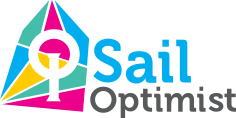News View of an "OptiMum"
View of an "OptiMum"
When my daughter sailed home.......
When my daughter sailed home.......
When my daughter sailed home by Mary E Black public health physician, Belgrade, Serbia
At the European Optimist sailing championship in Strunjan, Slovenia, this June, 250 children from 40 countries competed for six days on the wide, wide sea. I was a proud "OptiMum" with two children in the Serbian national team. "Oppies" are the boats in which the world learns to sail. Children are captains of their own ship. Competing is about winning; but more importantly it is about gaining a love for sailing and learning life lessons.
There we were, of all nationalities, waving our children off from the shore. I thought of parents who have stood on shores waving their children off as they embark on a desperate search to escape poverty, or after a family argument, or off to war, unsure if and when they will meet again, hoping they would meet kindness and help on their journey. Although sailing can never be totally safe, we were fortunate to know that our children would sail home to us.
On the last race my 14 year old daughter gave up her boat for her 12 year old brother; his rudder had fallen off, and as he was the leading sailor in the team she did not hesitate when the coach suggested it, even though her own points would suffer badly. She limped back alone for 2 miles in his rudderless craft using only a sail, until the shore team helped her out. "Finally," she said, her face shining and without a trace of regret. "I think I really learnt a lot about sailing downwind."
Humans collaborating constructively is a wonder. In Strunjan the systems were not fully in place, yet a mini-army of coaches, team leaders, judges, cooks, boat washers, boat measurers, photographers, and parents jumped into action for a week to get the fleet safely on the water. They made the regatta a huge success by pooling their skills, invoking past experience, filling in gaps in the system, and, above all, doing the right thing.
There is a satisfaction I have always found as a doctor and which we do not speak about enough. I refer to the quiet joy of teamwork, when the situation is messy and uncertain, but for the greater good of others we create a bigger sum from the parts. We can focus endlessly on getting systems right, on setting standards, on developing care pathways. But systems alone are not enough; they may not be invoked, or they may break down. For good health care we need people and not machines. People who will work hard to do the right thing, irrespective of how the systems are set up. People who will help others who journey on life's waters with a broken rudder.
Published 29 July 2009 in the British Medical Journal and reproduced by kind permission of Mary Black


 Login
Login 
